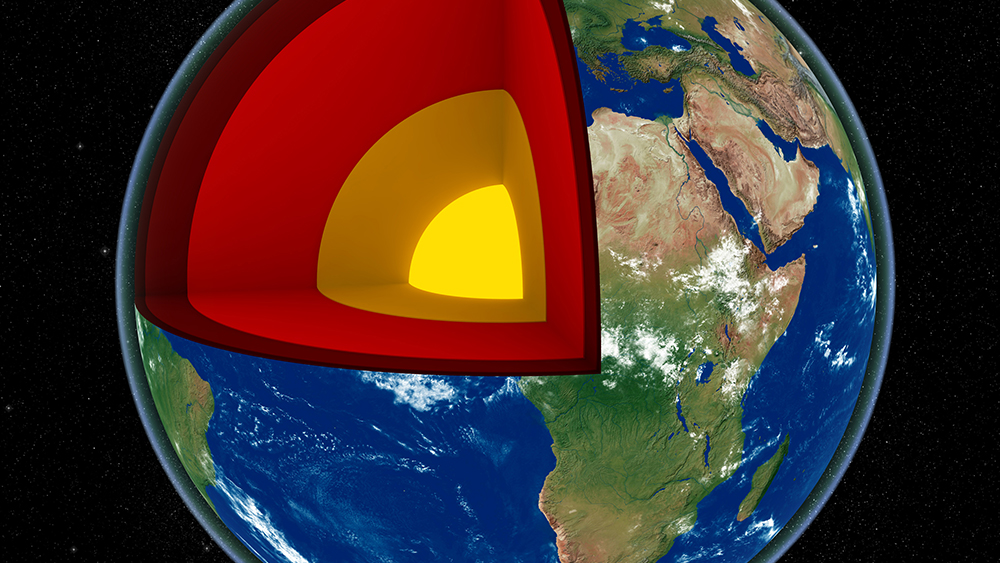Earth’s iron-nickel core has a solid inner layer and a liquid outer layer. A recent paper presents a huge dilemma for naturalistic explanations of Earth’s origin. Earth’s solid inner core shouldn’t exist!1
Secular scientists had long assumed the inner core was initially in a liquid state but that lower temperatures caused the liquid at the center to begin to solidify. Supposedly the solid inner core grew over time, eventually reaching its presumed current diameter of about 760 miles.2
However, the authors of this paper realized that this secular story had overlooked a critical detail: how the solidification process started in the first place. They realized this process required either (1) a large, rapid temperature drop of about 1,000 degrees Celsius to a temperature below the core’s melting temperature, or (2) the addition of an already-solid metallic nugget into the core. Since secular scientists think the core would require a billion years for its temperature to drop even one hundred degrees, they concluded that a rapid temperature drop was implausible. On the other hand, the metallic nugget would have started dissolving as it somehow dropped from the Earth’s mantle into the core. In order for this second scenario to work, the nugget would need to be ridiculously large, about 20 kilometers in diameter, for it to survive dissolution on its journey to the center of the Earth.
This means that secular scientists cannot, at present, plausibly account for the existence of the Earth’s inner core! So, if naturalistic processes cannot account for the existence of the inner core, then it appears to have been supernaturally created. This is what the Bible teaches and creation scientists strongly affirm.
Creation scientists have long pointed out that the incredible complexity of living things demands a supernatural Creator. ![]()
There is an important lesson here. Creation scientists have long pointed out that the incredible complexity of living things demands a supernatural Creator. But this recent research shows just how difficult it is for secular scientists to explain the origin of even “simple” things, like Earth’s inner core. The structure of Earth’s core is trivially simple compared to the inner workings of a cell or the coded instructions in the DNA molecule. Hence, one would tend to think that these secular scientists would have no trouble at all explaining how Earth’s inner core formed. And yet they are at a complete loss to explain its origin.
We see examples of this in other areas of the origins controversy. Stars are also relatively simple structures, essentially giant balls of gas. How hard could it be to explain the origin of a giant shining gas ball? And yet secular scientists, despite their frequent claims that “star-forming” regions have been observed, have yet to devise a plausible secular explanation for star formation. And no one has ever witnessed the actual process of star formation itself. Secular star formation scenarios are beset by multiple theoretical difficulties, the most serious of which is that they require at least one generation of stars to already be in existence!3-5 Naturally, a theory of star formation that requires stars to already exist is hardly a convincing theory.
The more we learn about the universe, the less plausible evolutionary stories become. ![]()
The more we learn about the universe, the less plausible evolutionary stories become.
References
- Huguet, L. et al. 2018. Earth’s inner core nucleation paradox. Earth and Planetary Science Letters. 487 (April 1): 9-20.
- Specktor, B. Earth’s Inner Core Shouldn’t Technically Exist. LiveScience. Posted on livescience.com February 9, 2018, accessed February 16, 2018.
- Thomas, B. Young Blue Stars Found in Milky Way. Creation Science Update. Posted on ICR.org June 9, 2011, accessed February 16, 2018.
- Psarris, S. 2012. What You Aren’t Being Told About Astronomy. Volume 2: Our Created Stars and Galaxies. DVD.
- Some computer simulations have purported to demonstrate the process of star formation, but these simulations generally require dark matter, which is not well understood. Some scientists think it may not even exist in large quantities.
*Dr. Jake Hebert is Research Associate at the Institute for Creation Research and earned his Ph.D. in physics from the University of Texas at Dallas.













